'Hallelujah!' | United Methodist vote rallies Austin pastor Tracey Beadle's faith quest
At one point in late April, during her guest sermon at Manchaca United Methodist Church, the Rev. Tracey Beadle, current pastor at Westlake United Methodist Church, announced some tentative vote tallies.
To Beadle, the results were more than promising.
That same weekend, United Methodists were wrapping up their General Conference in Charlotte, North Carolina. Representatives from Zimbabwe to the Philippines voted on three related historic issues that had torn the Methodist communion apart for decades.
The delegates removed a ban on same-sex weddings. From the official report: "United Methodist pastors no longer face potential penalties for being in a same-sex relationship, or officiating at same-sex weddings, nor can they be compelled to officiate one."
They approved a change to the requirement that clergy practice “celibacy” in singleness — an addition made in 1984 that targeted gay candidates for ministry.
Instead, in addition to integrity in all personal relationships, they added a requirement for “social responsibility and faithful sexual intimacy expressed through fidelity, monogamy, commitment, mutual affection and respect, careful and honest communication, mutual consent, and growth in grace and in the knowledge and love of God.”
"The harmful sexuality clause was removed from the United Methodist Book of Discipline by a 93% vote today!" Beadle said on May 1. "Hallelujah!"
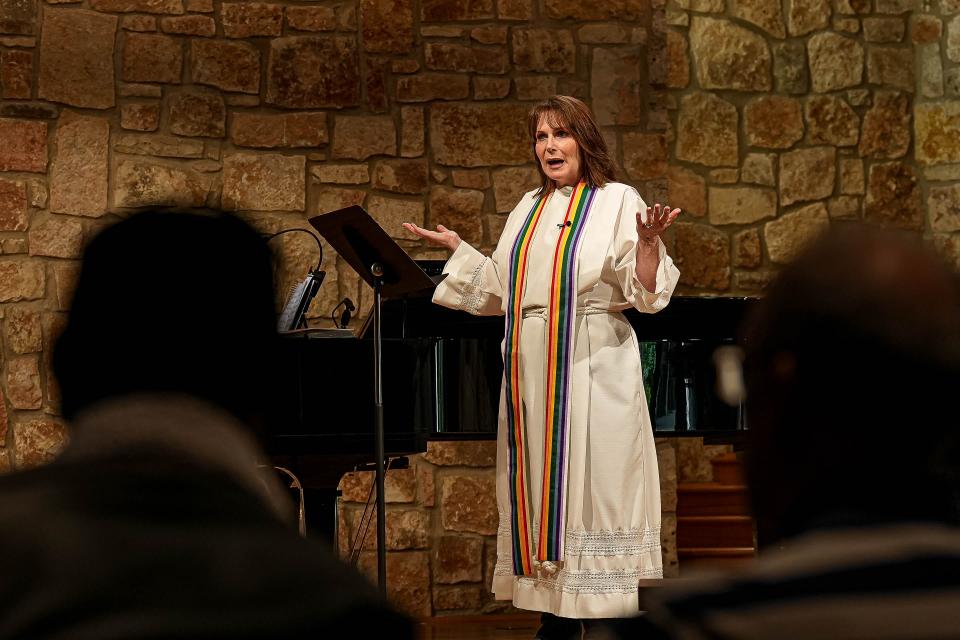
The victory for Beadle's contingent of Methodists was not without a bittersweet note: Since the last General Conference, in 2019, right before the pandemic, some 22 percent of the United Methodist congregations in the U.S. — anticipating changes likely to pass in 2024 — "disaffiliated." Some formed the Global Methodist Church, others the Methodist Collegiate Church, and others became independent congregations.
Four churches in the Austin area are in the process of following suit.
Beadle, married with two children, took the international vote personally. One of her congregants, Louise Morse, 98, who helped found Westlake Methodist in 1973, came out to the church in 2019. That year, Beadle showed churchgoers an emotionally charged 8-minute video about Morse's faith journey.
Beadle, who spent much of her life asking questions about traditional religious views, visited Morse and shared the news not long after the conference votes were announced in late April and early May.
Morse: "I can't believe I get to live the rest of my life in a church that thinks I'm OK!"
'I'd gather all the kids around and preach to them.'
Pastor Tracey Beadle was born in Charlotte on Oct. 23, 1969. Her father, Bob Bowles, an electronics technician, and her mother, Wanda Carpenter, a real estate agent, were unchurched.
Her parents separated when Beadle was 2, and she lived with her single mom until her mother remarried when she turned 14. Creative, playful, and empathetic, she explored the outdoors and tended to stray animals.
"One time, a friend and I decided we were going to take care of all the strays," Beadle said. "We checked their ears and wrote up reports. We also went door to door offering our services as 'pet detectives.' We'd find lost pets for $2 a day plus expenses."
As a divorced woman, her mother felt unwelcome in most churches, but that did not dampen Beadle's curiosity about the world of faith.
"As a child, I'd gather all the kids around and preach to them from the flat roof of a dog house," she said. "Both sets of grandparents were Methodists. I didn't understand the differences between the denominations, but I'd go to church with them. I was very curious and asked a lot of questions."
One repeated inconsistency haunted Beadle: "God is love. Jesus loves you. At the same time, you heard: 'God is kind of tricky. If you weren't careful, you would burn in hell.'"
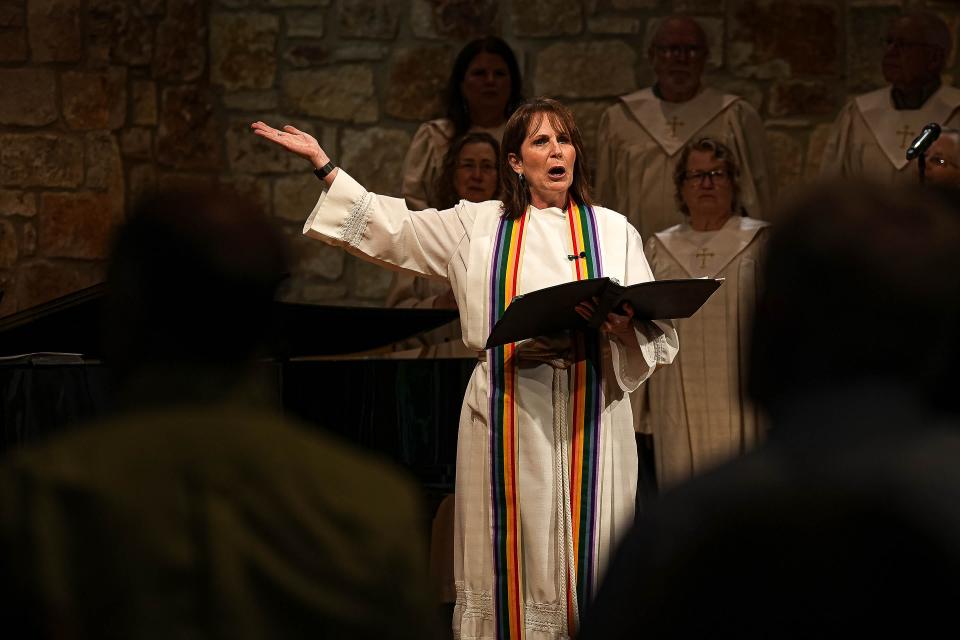
Why were women expected to remain subservient?
Beadle made good grades. She was interested in acting. She majored in theater at the University of North Carolina at Chapel Hill. After playing some theatrical roles, she experimented with less conventional performance art.
"I had the most fun I ever had in plays directed by performance artists," Beadle recalled. "It was detached from reality; you could abandon yourself."
She still interacted with theology while struggling with the notion "that someone could be condemned to hell by a loving God, just because, for instance, they were raised a happy, faithful Jewish person. This seemed absurd to me."
One thing always stuck in her craw: Why couldn't women preach to men? Why were women expected to remain subservient?
She tried a Unitarian-Universalist church and explored New Age spiritualities.
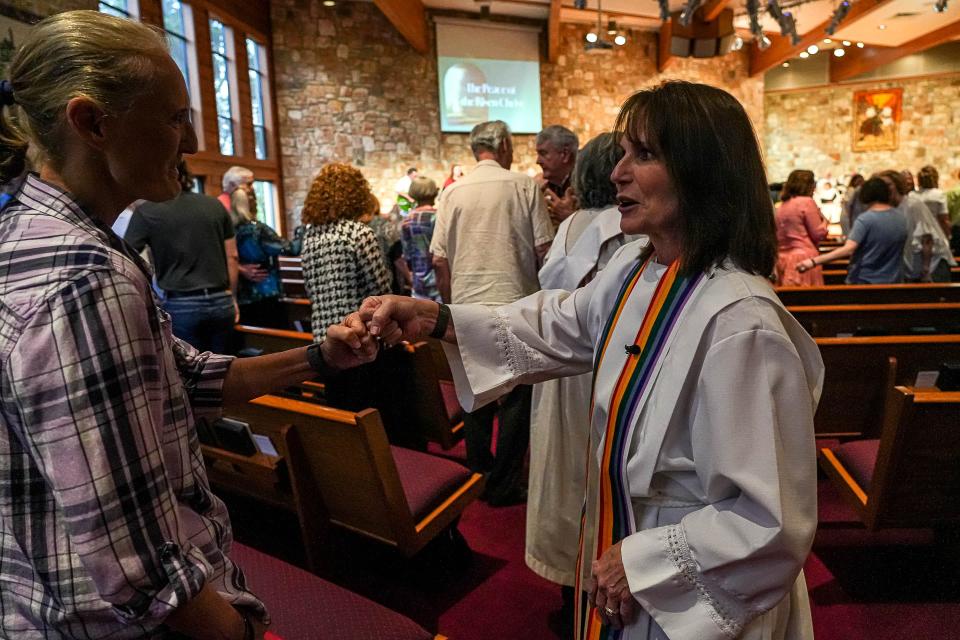
Beadle: "I was trying to find a relationship with God that didn't feel limiting."
After some time as a starving actor in New York, she returned to North Carolina, where she could pursue acting on the side. Then she met James Beadle, who worked in the transportation industry. The couple moved to Texas.
"After our second daughter was born, I started looking again for a church," Beadle said. "I very much wanted to be part of a faith community. I wanted my children to grow up with the stories of Jesus and the Bible in their bones."
She discovered that nondenominational churches were not the answer for her.
"I was attracted to the praise music," Beadle said. "The people would be nice. Then I'd learn that they had the same understanding of the roles of women and of hell. So I got out the Yellow Pages and just started calling churches. One of the first things I'd ask: 'Can women preach in your church?'"
The person who answered the phone at Bracken Methodist Church in suburban San Antonio, replied: "I don't see why not."
How the United Methodists got united
Bracken Methodist Church, located on a country road and led by Pastor Mickey McCandless, was historically part of the United Brethren in Christ. The Brethren were founded in America in 1767 during a spiritual renewal movement known as the Great Awakening. The church appealed especially to German American colonists. The Brethren began to splinter in the late 19th century, and during the 1960s, one evangelical wing joined the Methodists, known after the merger as United Methodists.
At the same time, in 1968, some of the traditionally Black Methodist congregations joined with the white United Methodists. One of the leading churches of East Austin, for instance, is Wesleyan United Methodist Church on San Bernard Street. Other Black groups, such as the African Methodist Episcopal Church (A.M.E.), went their own way.
Beadle found her faith community with the United Methodists long after these external and internal unions had settled into place.
"They had a blended service with hymns and praise music," Beadle said. "The people were really friendly. They laughed out loud in the middle of that first worship service! Oh my gosh, this was not what I was looking for, but I thought, this is going to be my church."
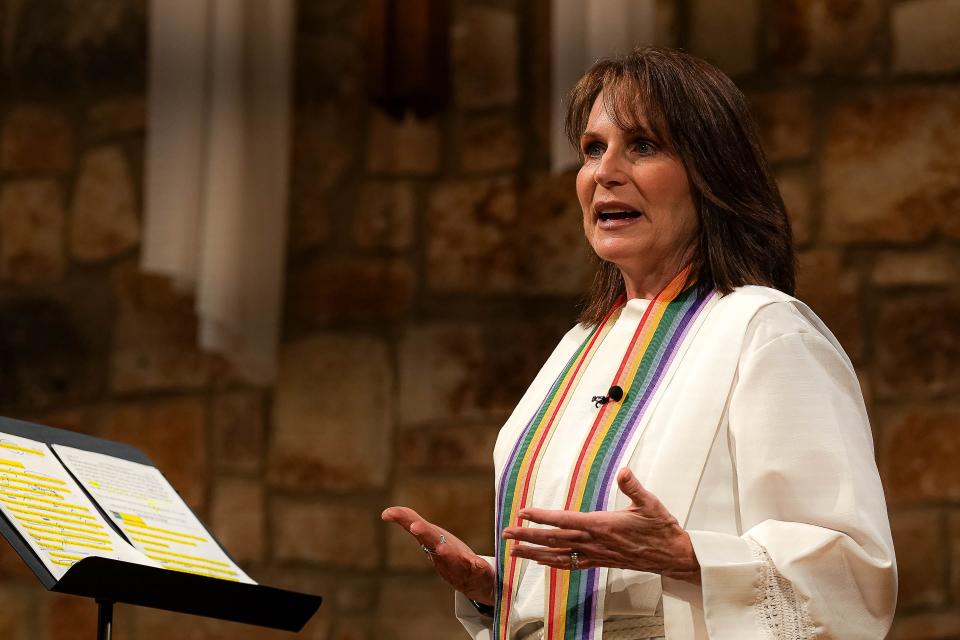
Pastor McCandless encouraged Beadle, who never stopped asking questions, to explore the ministry. She met with clergy and lay people to find out whether she had a calling.
"I wasn't sure at first if I was called to serve in the local church," she remembered. "But I was called to the seminary to study theology as I continued to have questions about the Bible and my understanding of God."
In 2008, the Beadles move to Austin, where she attended the Austin Presbyterian Theological Seminary, north of the University of Texas campus. It attracts Methodists and Baptists as well as Presbyterians.
"Overall, it was wonderful," said Beadle, who never let up on her faith inquiries. "But there were challenges. Some seminarians came from a more conservative theological place, and the experience was shattering for some of them.
"For me, it was a deep drink of cold water. I thought, thank God there are ways to interpret and understand scripture that are more consistent with how I understand God to be."
A spiritual leader at a time of wider cultural conflict
After Beadle's training at the seminary, she underwent two additional years of theological learning through interviews, writing and retreats. After becoming a minister, she was appointed to be an associate pastor at First United Methodist Church in Austin, and then an associate pastor at Manchaca, before she was appointed at Westlake as their senior pastor in 2017.
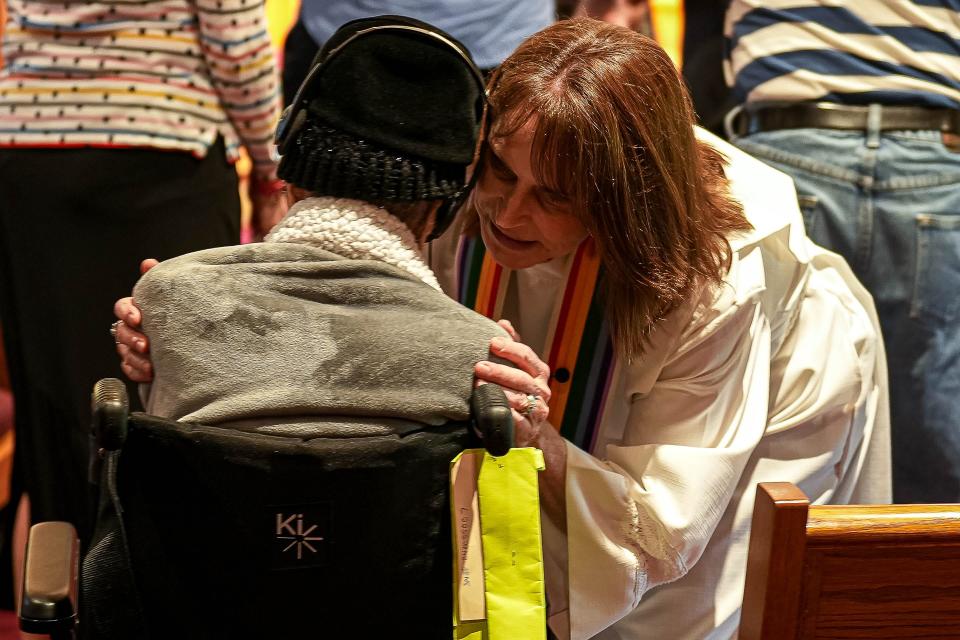
Methodists are organized somewhat like Episcopalians—both denominations are led by bishops. Beadle's churches have been part of the Capital District, a part of the San Antonio Episcopal Area, which meets annually as the Río Texas Annual Conference, headed by Bishop Robert Schnase.
For decades, mainstream American Protestant churches have been wrestling with issues attached to sexuality. Some, like the Methodists, began to vote in local churches to affiliate with Reconciling Ministries Network, or to become "reconciling," in other words, they welcomed LGBTQ congregants.
Still, the official rules did not change. The Methodist General Conference usually meets every four years. Yet a special conference was called in 2019 to find a way forward for the UMC as it relates to LGBTQ inclusion. The "One Church Plan" proposed the removal of certain language related to sexualities while allowing annual conferences and local churches to administer the results. To the surprise of many, a proposal to double down on the discriminatory, disciplinary language passed narrowly.
"It was very upsetting," Beadle said. "It ended up creating a lot more disruption."
The COVID-19 pandemic delayed the regularly scheduled 2020 General Conference. During the intervening years, those churches that supported the traditional, more conservative language used a "gracious exit" clause that allowed them to keep their property if they disaffiliated.
Beadle, who celebrated the historic votes with her congregation on May 5, has urged local Methodists to become peacekeepers rather than just witnesses during America's culture wars. She wanted those who disagree with one another to speak learn and practice strategies for engaging in respectful conversation. She and a team of church members put together small groups to encourage honest engagement on an ongoing basis.
"We don't know how to have civilized conversations about things that matter that we disagree on," she told American-Statesman columnist Bridget Grumet in 2022. "If the church is going to remain relevant, we need to be able to have those conversations, so that we can determine as a congregation what a faithful response might be to many of the things that challenge us today."
This article originally appeared on Austin American-Statesman: Austin pastor Tracey Beadle heartened by United Methodist inclusivity

